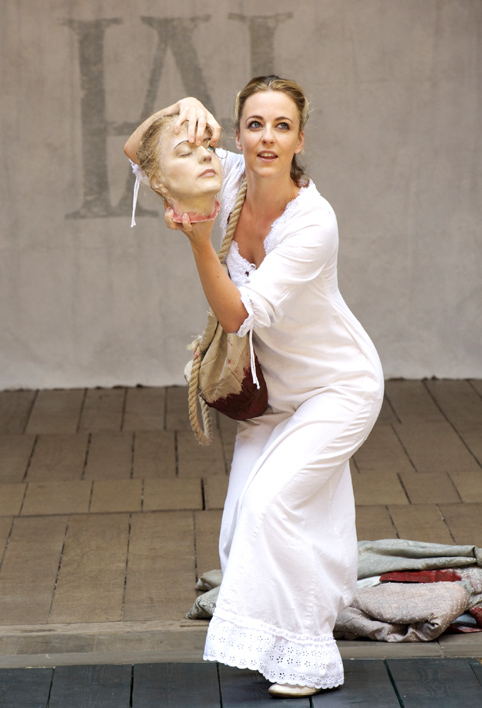Anne Boleyn
By Howard Brenton
Shakespeare’s Globe, Bankside
Until 21 August, Tickets: £5 – £35
IT’S the little emphases throughout Howard Brenton’s new play at the Globe that distinguish it as a modern take on the origins of the English Reformation.
Anne Boleyn was Henry VIII’s second wife, and his divorce from Catherine of Aragon necessitated a break with the Pope and a whole battalion of theological arguments to justify it.
As Brenton presents Anne, she is a strong-willed, fun-loving character with a passion for the new Lutheran heresies damned at the English court.
Bibles for the common man! Perish the thought!
The first character on stage is Anne (Miranda Raison) as her ghost, revealing her Bible in the explosive new translation by William Tyndale, and her head, both plucked out of a bag.
It sets the lightness of tone of the entire play, which is a romp through the conflicts of ideas and interests that besieged the Tudor court, setting in motion the dastardly intrigues of Thomas Cromwell (John Dougall) and others.
Yet the ideas are closely argued in the drama, not diluted, with Brenton presenting them as fights between colourful personalities.
It makes for lively engagement: the audience loved it.
The second character on stage is James VI of Scotland (a camped-up James Garnon) at the point he became James I of England, who inherited the sorry mess of church schisms and himself set up the machinery to produce a new translation of the Bible (based on Tyndale’s first translation).
At one point he talks prophetically about the Puritans setting down the road to revolution.
Civil war was still a century or so away as the material interests revealed in Anne Boleyn’s day were racked up to breaking point, but Brenton highlights the fact that Henry VIII (Anthony Howell) stands to gain the wealth of the Church if he declares independence from the Pope: high ideals and base motives unite.
That is handy for Henry because he also gets a prime ambition of his, to bed Anne, whose sexual teasing of him has gone on for seven years.
Brenton presents this affair as a real love story, rather sweet, leaving the hard-headed business of practical politics to his Chancellor Cromwell, a closet Protestant who keeps the Lutheran heretic Tyndale under a discreetly protecting wing, and declares himself to Anne only to betray her later, as his interests lie in the cash from the dissolution of monasteries.
Anne is a very modern sort of character as played by Miranda Raison and written by Brenton.
She is single minded, unintimidated by men and their ideas and thoroughly independent.
Yet she is constantly wrong-footed by them.
At one of her secret encounters with William Tyndale in the woods, she justifies her marriage to Henry, citing the Bible’s approval in Leviticus (about not marrying your brother’s widow).
He counters with Deuteronomy and a more flexible approach to the revealed meaning of God’s word, which puts Anne at sea without anchor as the Bible becomes a vehicle for interests and not ideals.
The revelation makes James VI/I’s encounters with rival groups of theologians very funny, as a trivial disagreement over church rails becomes a battle over feudal rights against egalitarianism and the common man.
Nonetheless, Anne’s introduction of the Lutheran creed into the court set the torch alight and split the nation along class lines that could only be resolved by revolution and the end of feudalism.
Brenton is not engaged in polemics though.
This play does a remarkable sleight of hand: it turns the history play that Shakespeare never wrote into a comedy of errors, retaining the sharp conflict of ideas, and making, with hindsight, something bright, funny and sharp for a superb cast to bring to life for a modern audience.
